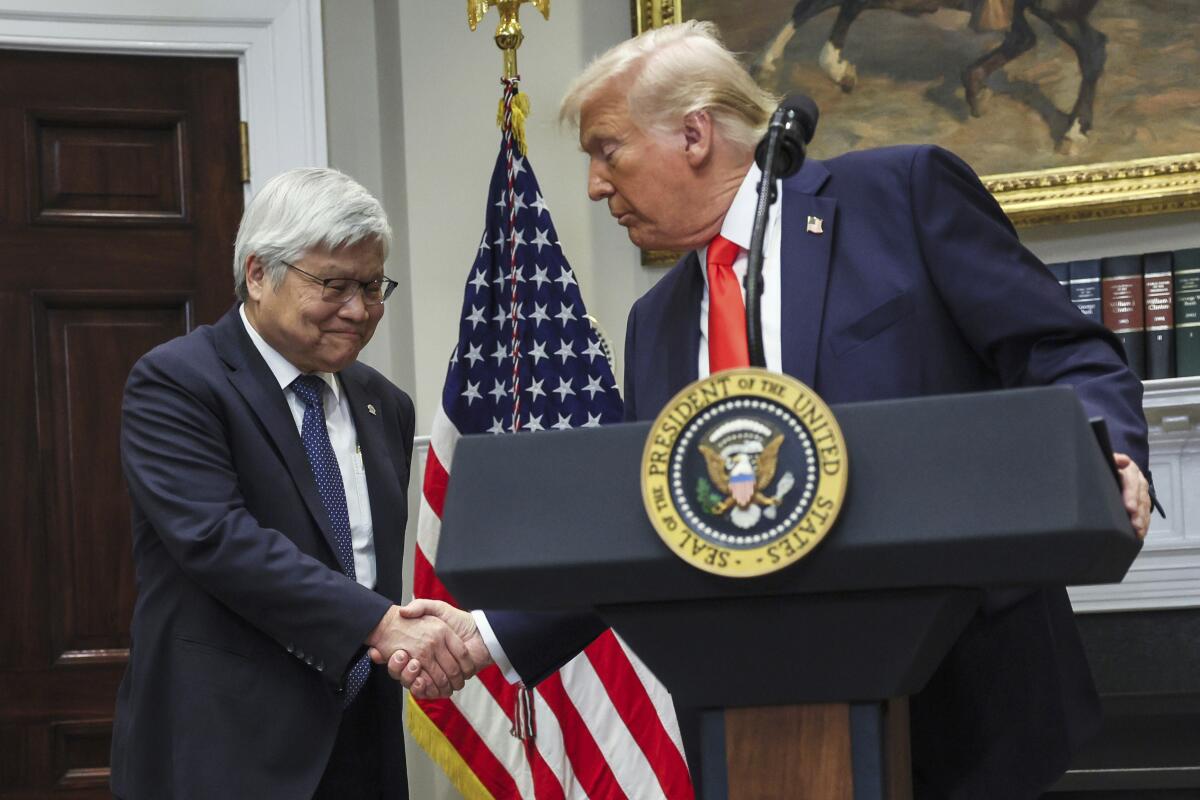If the Trump administration remains oblivious to the dangers and provocations of Lai Ching-te’s policies, the confrontation between Beijing and the United States over the island will intensify.

U.S. President Trump shakes hands with C.C. Wei, chairman and chief executive of Taiwan Semiconductor Manufacturing Co., in the Roosevelt Room at the White House on March 3, 2025. (Photo: Associated Press)
Voluminous commentaries have been written on the uncertainty of the Donald Trump administration’s foreign policy. A research fellow from a conservative Washington think tank quipped that if anyone claims to know Trump’s next move, he must be bluffing. Three key factors — the “Three Ps”— are what create the uncertainty:
First is personality. Trump’s transactional approach to governance inherently breeds unpredictability. Second is priority. The administration is laser-focused on the Ukraine crisis, a pressing issue, as well as on the Western Hemisphere, America’s strategic backyard. When these priorities might shift to another crisis or region is anyone’s guess. Third is process. Trump's idiosyncratic style has led to an erratic foreign policy decision-making process. The policy team, an amalgamation of national security hawks, MAGA loyalists, Wall Street elites and Silicon Valley tech advocates, further complicates matters. It’s unclear who will sway Trump, or when, or how.
The Trump administration’s policies on China are marked by both certainty and uncertainty. Earlier this year, I published an article in China Review Monthly analyzing the variables. Several recent moves by the Trump administration merit immediate attention.
First, the U.S. State Department website removed the phrase “does not support Taiwan independence” from its list of positions regarding the island. This statement had been part of the “reassurance” of the U.S. government to Beijing, and its removal suggests that mid-level national security and foreign policy officials believe the United States has offered too much reassurance and see the need to recalibrate the delicate balance between deterrence and reassurance.
Second, in his first address to Congress, Trump announced that Taiwan Semiconductor Manufacturing Company would invest $165 billion in the United States. During his election campaign, Trump criticized Taiwan for stealing America’s semiconductor industry. TSMC’s investment in the U.S. is a response to Trump’s pressure, and it seems to have delivered. The U.S. will press TSMC to serve the strategic goal of localizing the semiconductor production supply chain to boost the U.S. economy.
Third, in an interview with Liberty Times, American Institute in Taiwan Director Raymond Greene explained the Trump administration’s policy at length. Given that the assistant secretaries in the U.S. State Department, and the assistant defense secretary for East Asia have not yet been appointed, his remarks provide the best insight so far on U.S. policy. The key takeaways are:
• The Trump administration is currently focused on refuting skeptics regarding the U.S. pivot on Taiwan, asserting that there has been no change;
• Stepping up cooperation with Taiwan in areas such as technology (e.g., artificial intelligence) and energy, and boosting the flow of liquefied natural gas from the United States;
• Enhancing military cooperation and encouraging political forces across the spectrum to support boosting defense capabilities, which reflects Trump’s priority of maintaining peace and stability in the region.
So far, the Trump administration’s Taiwan-related policies have remained within expected boundaries. However, the policies pursued by the island’s authorities under Lai Ching-te are deeply troubling.
First, by demonizing and stigmatizing all political voices and social groups that support cross-strait exchanges, Lai is tearing the island’s social fabric apart, provoking confrontation to shore up his base. Worse, the administration is attempting to promote Taiwan statehood and eradicate the perception of Chinese national identity.
Second, Lai openly and provocatively labels the Chinese mainland a “hostile foreign force” in an attempt to change the status quo of cross-strait relations. The aim is to accelerate decoupling, but this heightens the risk of miscalculation and misjudgment.
Third, Lai undermines electoral outcomes and suppresses opposition parties by tabling motions to unjustifiably remove their representatives.
A generally held view in Washington policy circles is that Lai is unlikely to push for independence, based on three main factors — he garnered only 40 percent of the votes in the election, indicating a relatively weak leadership position; his party, the DPP, holds a minority in the Legislative Yuan; and the region is considered a mature democracy. Additionally, Washington believes that the Chinese government claims Lai is an independence-seeker as a pretext to ramping up military activities in the region. Consequently, the prevailing opinion is that U.S. policy should focus on bolstering comprehensive deterrence against China to avoid conflict.
The actions taken by the Lai authorities reflect a significant misjudgment by Washington, namely the failure to grasp the perilous consequences of its own policies. The U.S. has looked away from the Lai authorities’ relentless drive for normalization of statehood and even framed the promotion of an independent identity as a free choice in a democratic society, rather than recognizing the pro-independence character that it really has. Moreover, the U.S. has disregarded actions to impede normal cross-strait exchanges by the Lai authorities and the DPP. Instead, it accuses the Chines government of adopting “coercive” policies towards the region. The U.S. views the Taiwan issue and its own policies through a parochial military security lens, asserting that the Chinese government is altering the status quo. Instead, the Americans suggest that the U.S. can scale back “reassurance” but step up comprehensive “deterrence.”
Trump’s repeated statements have signaled his endorsement of “strategic ambiguity” and his desire to avoid military conflict with China. However, if the Trump administration remains oblivious to the dangers and provocations of Lai’s policies within the island and across the Taiwan strait, while wrongly accusing the mainland of disrupting peace, then the rivalry between Beijing and the U.S. will intensify in the foreseeable future, which means more challenges for the stable growth of China-U.S. relations.